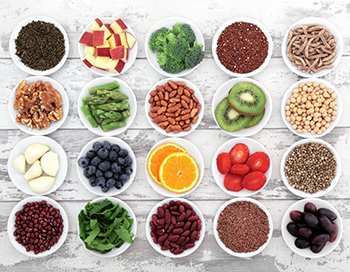Eating Healthy: the Basics
1. What is a healthy breakfast?
2. What is a healthy lunch?
3. What is a healthy dinner?
4. How much should I weigh?
5. How many calories should I be eating?
6. What is the best way to lose
weight?
7. How can I keep my weight loss
goal in mind and stay motivated?
8. What is a healthy weekly weight loss?
9. How to set weight loss goals and make
them happen
10. How to keep a food diary, and
why it is essential to successful weight loss
11. Are all fats bad for you?
12. Are saturated fats bad
for you?
13. Are
unsaturated fats good for you?
14. Are carbohydrates bad for you?
15. Is fiber good for you?
16. How to read nutrition/food labels
17. How to plan your weekly menus
18. Why should I eat less salt?
19. What
do the sodium (salt) numbers mean on food labels?
20. What is The Mediterranean Diet?
21. Why eating vegetables is good for
you
22. Why eating fruit and nuts
is good for you
23. Why are cereals and whole grains good for you?
24. What are legumes, and why are they good for you?
25. Why is eating fish good for you?
26. Which fats and oils are good for
you?
27. Are dairy products good for you?
28. Which meats should I not eat?
29. Is drinking alcohol good for
you?
30. Is it important to measure your
ingredients?
31. Are snacks good for you?
32. How to choose the right portion size
33. Can you lose weight with a smaller
plate?
34. Eat healthier by cleaning out your
pantry
35. Which oils and fats should I keep in my pantry?
35. Which oils and fats are good for you - and when should I use them?
36. Which carbohydrates are good for you?
37. What is the best chicken or turkey for you?
38. Are dairy products good for you?
39. Which nuts and seeds should I eat?
40. Is red meat like beef or pork bad or good for you?
41. Is eating dessert good or bad for
you?
42. Is drinking soda bad for you?
43. Is drinking coffee bad for you?
44. How can healthy food taste good? Part 1
45. How can healthy food taste good? Part
2
46. How to eat healthy while eating
out
47. Are vitamins and supplements necessary
to eat healthy?
48. How to eat healthy while traveling
Eating Healthy: the Basics
How many calories should I be eating?

"Just what the heck is a calorie and what do I do with it?!" I hear this a lot from my patients and knowing the answer is the basis for success in eating well and losing weight.
The calorie is a unit of measure of energy, sort of like the watts on a light bulb. It takes more energy (watts) to burn a brighter bulb just as it takes more energy (calories) to climb the stairs than using the elevator.
But not everyone needs the same amount of calories. A 5 foot 4 inch woman needs far less fuel (calories) than a 6 foot 2 male. Think of this as the difference between a compact car and a big pick up truck. (The truck just gets fewer miles per gallon - and that's where that metaphor breaks down.)
So how many calories should you be eating to lose weight? It's pretty simple really.
Take a look at this BMI table to see your Ideal Body Weight (that's the one listed under the heading of 22). Multiply your Ideal Body Weight by 11. Let's say that your Ideal Body Weight is 145 pounds. You need about 1,600 calories each day for your body to function (145 x 11 = 1595). That's your baseline.
For most people it doesn't take many extra calories each day to add on pounds (or lose them). Of everything that I'll discuss with regard to weight loss, the most important thing for you to focus on is calories: more than fats, more than protein and more than carbs.
To lose about a half pound each week you need to eat 250 calories less than your baseline each day. So if you should weigh 145 lbs. you'll need to eat about 1,350 calories per day to lose weight. You can burn those calories exercising - and should - but we'll talk about that later.
